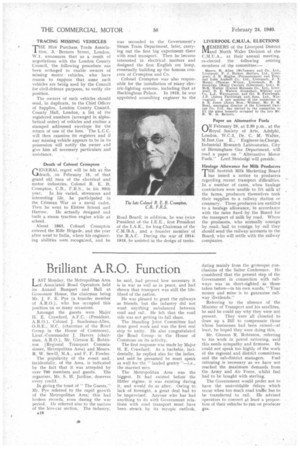Brilliant ARO, Function
Page 20

If you've noticed an error in this article please click here to report it so we can fix it.
LAST Monday, the Metropolitan Area of Associated Road Operators held its Annual Banquet and Ball at Grosveno'r House, the chairman being Mr. J. F. E. Pye (a founder member of A.R.0.), who has occupied this position on so many occasions.
Amongst the guests were Major II. E. Crawfurd, A.F.C. (President, A.R.0.), Colonel J. Sandeman-Allen, 0.B.E., M.C. (chairman of the Road Group in the House of Commons), Lieut.-Commander J. Havers (chairman, A.R.0.), Mr. Gleeson E. Robinson (Regional Transport Commissioner, Metropolitan Area) and Messrs. R. W. Sewill, M.A., and F. F. Fowler.
The popularity of the event and, incidentally, of the Area, is indicated by the fact dhat it was attended by over 700 members and guests. The organizer, Mr. S. H. Jardine, deserves every credit.
In giving the toast of " The Guests," Mr. Pye referred to the rapid growth of the Metropolitan Area; this had broken records, even during the war period. Ile referred also to the success of the hire-car section. The industry, he said, had proved how necessary it is in war as well as in peace, and had shown that transport was still the lifeblood of the nation.
He was pleased to greet the railways as friends, but the industry did not want anything unbalanced between road and rail. He felt that the road side was not getting its full share.
The Standing Joint Committee had done good work and was the first real step to unity. He also congratulated the Road Group in the House of Commons on its activity,.
The first response was made by Major H. E. Crawfurd, As a bachelor, incidentally, he replied als,o for the ladies, and said he presumed he must speak as well for the " landed gentry "—i.e., the married men.
The Metropolitan Area was the biggest. It had existed before the Hitler regime, it was existing during it, and would do so after. Owing to lack of foresight, a great deal had to be improvised. Anyone who has had anything to do with Government relations with road transport must have been struck by its myopic outlook, dating mainly from the grotesque conclusions of the Salter Conference. He considered that the present step of the Government in connection with railways was as short-sighted as those taken before—in his own words, "Your money and mine is to guarantee railway dividends."
Referring to the absence of the Minister of Transport and his satellites, he said he could say why they were not present. They were all closeted to draw up a Bill to compensate those whose businesses had been ruined—at least, he hoped they were doing this.
Mr. Gleeson R. Robinson, referring to his work in petrol rationing, said this needs sympathy and firmness. He could not speak too highly of the work of the regional and district committees and the sub-district managers. Fuel rationing is necessary as we have not reached the maximum demands from the Army and Air Force, whilst fuel had to be bought with sterling, The Government would prefer not to have the unavoidable delays which occur when too much road traffic has to be transferred to rail, He advised operators to convert at least a proportion of their vehicles to run on producer gas.




















































